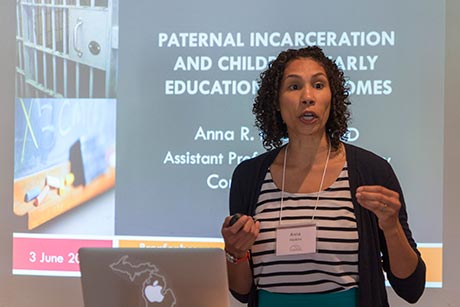Talks connect faculty, youth-focused extension partners
By Ted Boscia

America’s soaring incarceration rate – far and away the highest in the developed world and disproportionately felt by racial and ethnic minorities – has dire consequences for the estimated 2.7 million children of imprisoned parents.
By age 5, such kids trail their peers in emotional and behavioral readiness for school – a disadvantage that can persist throughout their education, according to research by Cornell sociology assistant professor Anna Haskins. Speaking at the Bronfenbrenner Center for Translational Research’s (BCTR) fifth Youth Development Research Update, June 2-3 in Ithaca, Haskins described how such youth – boys especially – also are more likely to be held back a grade or assigned to special education by age 9, further widening the gap with their peers. Black and Hispanic children, far more likely than whites to have a parent in prison, suffer most.
“From a very young age, these children of the prison boom are on a pathway of cumulative disadvantage,” said Haskins, a former elementary school teacher, “leading to the transmission of inequality from one generation to the next.”
Haskins presented these findings to nearly 50 Cornell Cooperative Extension county leaders, 4-H educators and community partners who guide youth programs across New York. Organized by Stephen Hamilton, professor of human development, and Jutta Dotterweich, director of training and technical assistance for the ACT for Youth Project, the yearly event joins faculty experts and practitioners to trade insights, discuss the latest research and develop partnerships.
Jacqueline Davis-Manigaulte ’72, senior extension associate for Cornell University Cooperative Extension-New York City, approached Hamilton about partnering in a new project to help children of incarcerated parents.
“This event allows us to hear about the latest Cornell faculty research on youth development,” said Davis-Manigaulte. “But what I really enjoy is the powerful connections we make with faculty members who see the value in working with us on projects. It gives us a direct line to potential partners.”
Davis-Manigaulte also saw potential to work with Steven Alvarado, assistant professor of sociology, who detailed his studies on racial and ethnic STEM (science, technology, engineering, mathematics) achievement gaps. By as early as ninth grade, black and Hispanic students fall significantly behind their white and Asian peers in enrollment in science courses and other measures, and Alvarado is exploring interventions to steer minority youth into the STEM pipeline.
In another form of inequality, Sharon Sassler, professor of policy analysis and management, described class differences in young couples’ cohabitation patterns. Moderately educated partners – those with a high school diploma but no college degree – tend to move in together more rapidly and for more urgent reasons (housing shortages or financial necessity) than college-educated peers. Sassler, who’s writing a book on cohabitation, suggested policy changes to put young couples on more equal footing.
Dawn Schrader, associate professor of communication, presented her longitudinal study investigating the nature of gossip by teen girls in public schools. Schrader painted a complex picture: Shifting relationships can lead to sudden role changes – from victim one minute to bully the next. Selfies, text messaging and Snapchat ripen the conditions for conflict. “We’re talking about someone losing a friend because she didn’t put the right emoticon in her text message,” Schrader said.
At a panel discussion, alumni and faculty members praised event co-organizer Hamilton, an expert on youth development and mentoring for more than 40 years at Cornell who will retire next month to become president of San Diego’s High Tech High Graduate School of Education.
“Steve has embodied the outreach model throughout his time at Cornell,” said Jane Powers, BCTR senior extension associate. “His belief has always been that we must get our knowledge out to the people who need it most – policymakers, frontline workers, parents and others.”
Ted Boscia is director of communications and media for the College of Human Ecology.
Media Contact
Get Cornell news delivered right to your inbox.
Subscribe